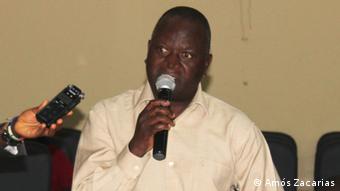Mozambique: MIREME strengthens public participation in the reform of the legal framework for the ...
Tete: Mozambican Bar Association criticises court ruling on Marara resettlement

DW / Coal mining in Tete has brought several problems for the population
The Jindal Africa company must resettle the community of Cassoca in Mozambique by mid-2019, the court ruled. The population has been waiting for six years. It is not happy with the decision.
The Indian company Jindal Africa must relocate the community of Cassoca in central Mozambique by mid-2019. These people have been waiting for more than six years for the move. The ruling was handed down by the Administrative Court of Tete after the Bar Association filed criminal proceedings against Jindal África at the Tete Administrative Court in 2017.
However, in an interview with DW Africa, João Nhampossa, representative of the Bar Association, said that the sentence failed to match the Bar’s expectations.

“This is a somehow timid ruling, from the point of view of the Bar Association, because it reflects a fear of the judiciary in holding the company accountable for a clear violation of the fundamental rights of the communities,” said João Nhampossa,
Six years waiting
Affected by Jindal’s mining operations, the community of Cassoca in the district of Marara is made up of more than 300 families who have been waiting for resettlement for more than six years.
Meanwhile, the mining company continues to operate in the central province of Tete, in violation of the law of land resettlement. “In the specific case of the community of Cassoca affected by the Jindal operations, this is a blatant situation, because they have been waiting for resettlement for more than six years, while they should have been resettled in the first place,” says João Nhampossa.
The Bar Association also demanded compensation for the affected families. However, the Tete Administrative Court did not rule on this.
The judicial decision acquits the Mozambican state of any blame for the delay in the resettlement process of the community of Cassoca, which for the Bar Association demonstrates the fragility of the judicial system.
“The Bar also thinks that it is a good strategy to see to what extent the judiciary is determined to do justice,” reiterates João Nhampossa, stressing that the State has responsibilities in the oversight of mining operations, in defence of communities, which, according to the Bar Association, is not happening.
More legal cases
Judicial proceedings were also opened against two other miners operating in Tete: Vale Moçambique and Internacional Coal Ventures (ICVL). “In the case of Vale, we want acknowledgement that the Cateme, 25 de Setembro and Bagamoio resettlement process was unjust and we want it to be restructured and demand compensation,” said João Nhampossa.

The provincial government of Tete, represented by João Alfredo, of the Provincial Directorate of Land and Environment, speaks of difficulties in talking to Jindal Africa. “Sometimes the company promises something and in the end, it does/not make it. The Government is not sleeping, it is aware of the situation that is going on,” he says.













Leave a Reply
Be the First to Comment!
You must be logged in to post a comment.
You must be logged in to post a comment.